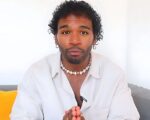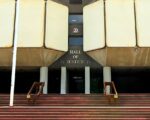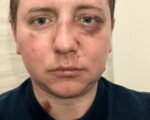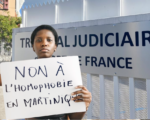>> United Church of Christ Lawsuit Says North Carolina Laws Restrict Freedom of Religion
Charlotte N.C. : Une coalition de membres du clergé contestent l’interdiction constitutionnelle contre le mariage homosexuel en Caroline du Nord en adoptant une approche inusitée en lien avec une poursuite déposée à l’échelle des États-Unis: selon ces représentants confessionnels, l’interdiction viole… leur liberté de religion.
L’Église unie du Christ, proteste contre l’interdiction constitutionnelle du « mariage entre conjoints de même sexe » en Caroline du Nord. Les membres du clergé souhaitent pouvoir en célébrer mais la loi le leur interdit :
« Les lois sur le mariage de la Caroline du Nord sont un affront direct à la liberté de religion », affirme le révérend J. Bennett Guess, qui oeuvre au sein de l’Église unie du Christ, sise à Cleveland, qui est l’un des plaignants dans cette affaire. « Nous croyons qu’il est important que toute personne participant à la vie communautaire de la congrégation puisse recevoir les mêmes soins pastoraux et un accès égal aux services religieux fournis par le clergé, peu importe leur orientation sexuelle. »
Mais en Caroline du Nord, le clergé est souvent aux prises avec une décision troublante, soit le fait de « devoir choisir entre le fait d’offrir ces services ou de violer la loi », dit M. Guess. « Voilà quelque chose auquel aucun membre du clergé ne devrait devoir faire face. »
En plus de l’Église unie du Christ, qui rassemble plus d’un million de fidèles, une dizaine de membres du clergé et de couples homosexuels désirant se marier font partie des plaignants dans cette cause. Les défendeurs regroupent entre autres le procureur général de l’État Roy Cooper, ainsi que plusieurs procureurs de district, ainsi que cinq autres participants.
Noelle Talley, une porte-parole du bureau du procureur général, a précisé que les responsables n’avaient pas encore pu voir le contenu de la poursuite.
La greffière du comté de Wake, Laura Riddick, a pour sa part dit être choquée d’avoir été nommée comme partie défenderesse. Son bureau gère les permis de mariage. « Il est ridicule, pour tout greffe, d’être poursuivi en lien avec le mariage gai, qui dépend des lois de l’État, et non pas des politiques des comtés. Seule la législature ou les tribunaux peuvent changer la loi. Notre travail, en tant qu’administrateurs des comtés, est d’appliquer la loi telle qu’elle est, comme nous l’appliquerons si elle change. Nous poursuive vient confondre le public, gaspille l’argent des contribuables et crée des conflits inutiles », dit-elle.
Plus tôt ce mois-ci, l’Union américaine des libertés civiles (UCLA) a lancé une nouvelle attaque juridique contre l’interdiction du mariage gai en Caroline du Nord, pressant un juge fédéral de rapidement annuler l’interdiction pour aider les enfants et les couples gais souffrant de graves problèmes de santé. L’organisme de défense des droits de l’homme a dit vouloir faire accélérer l’entrée en vigueur d’une décision découlant d’une poursuite déposée en 2012, en invoquant les besoins urgents en matière de soins de santé pour un enfant souffrant de paralysie cérébrale qui a été adopté par l’un des couples lesbiens impliqués dans l’affaire.
>> The General Synod of the United Church of Christ (UCC) filed a lawsuit today in U.S. District Court in Charlotte, arguing that North Carolina laws defining and regulating marriage as being between a man and woman restrict UCC ministers from performing their religious duties and are unconstitutional.
“The United Church of Christ is proud to defend the religious freedoms upon which this nation was founded”
The State of North Carolina prevents couples of the same gender from obtaining a marriage license and makes it a crime for ministers to officiate at a marriage ceremony without determining whether the couple involved has a license. The UCC says the law limits ministers’ choices, violates the principle of “free exercise of religion” upon which the church is built, and restricts the freedoms of religion and expressive association guaranteed in the First Amendment. The UCC seeks a preliminary injunction that would allow ministers to choose whether to perform a religious marriage.
“The United Church of Christ is proud to defend the religious freedoms upon which this nation was founded,” said the Rev. Geoffrey A. Black, general minister and president of the UCC. “It is unfortunate that even today, laws are designed to treat gay and lesbian people unequally. In its efforts to restrict gay marriage, the State of North Carolina has restricted one of the essential freedoms of our ministers and of all Americans.”
In 2012, North Carolina voters approved Amendment One, which limited a domestic legal union to a covenant between a man and woman. Under state laws consistent with Amendment One, it is a Class 1 misdemeanor for a minister to perform a marriage ceremony for a couple that hasn’t obtained a license, and such a license may not be issued to same-gender couples. A Class 1 misdemeanor is punishable by up to 120 days in jail and/or probation and community service. In addition, the laws allow anyone to sue the minister who performs a marriage ceremony without a license and collect up to $200 if they prevail. The UCC believes that this prohibition and penalties also apply to a minister performing a religious ceremony not intended to result in a legal marriage.
This limitation on free exercise of ministers, officers or others is in conflict with the UCC General Synod’s Equal Marriage Rights for All resolution adopted on July 4, 2005. This resolution affirms “equal marriage rights for couples regardless of gender and declares that government should not interfere with couples regardless of gender who choose to marry and share fully and equally in the rights, responsibilities and commitment of legally recognized marriage.”
The Rev. Dr. J. Bennett Guess, an officer of the Church and openly gay man, said, “The United Church of Christ believes in advocating for justice. We believe that the UCC is called to be a prophetic church. God calls the church to speak truth to power. We are standing up for the freedom of religion, and to protect the rights of our ministers to do their jobs in faith.”


















